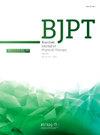严重创伤性脑损伤后第一年功能恢复的预测因素
IF 3.2
3区 医学
Q1 ORTHOPEDICS
引用次数: 0
摘要
外伤性脑损伤(TBI)幸存者通常会经历长期损伤,这可能会降低他们的生活质量和功能独立性。目的本研究旨在确定巴西严重脑外伤后功能恢复的预测因素。方法于2021年5月至2022年5月在某创伤转诊医院进行前瞻性观察队列研究。重度TBI (sTBI)患者,定义为入院时格拉斯哥昏迷评分(GCS)≤8分或由于头部创伤相关原因在72小时内。在出院和损伤后3、6和12个月,使用格拉斯哥结局扩展量表(GOSE)评估功能恢复情况。从电子记录中提取年龄、性别、损伤原因、入院时GCS评分、损伤严重程度评分(ISS)、瞳孔改变、减压颅骨切除术、机械通气支持天数(MVS)和教育程度等数据。在172名患者中,145人完成了随访。结果患者以男性居多(84.5%),文化程度低(55.2%),平均年龄45岁。男性(OR=9.38, 95% CI: 1.39, 62.97)和MVS天数较长(OR=1.41, 95% CI: 1.03, 1.48)预示出院时预后较差。在3个月时,ISS >25 (OR=3.37, 95% CI: 1.26, 9.03)、开颅减压术(OR=3.74, 95% CI: 1.05, 13.33)、MVS天数较长(OR=1.18, 95% CI: 1.07, 1.31)、低(OR=4.44, 95% CI: 1.19, 16.57)或中等(OR=7.41, 95% CI: 1.77, 31.02)教育水平预测功能预后较差。6个月时,减压颅骨切除术(OR=4.31, 95% CI: 1.37, 13.58)、MVS天数增加(OR=1.13, 95% CI: 1.05, 1.21)和出院时GOSE评分≤6与不良功能预后相关。12个月时,65岁(OR=4.95, 95% CI: 1.12, 21.84)、MVS天数越长(OR=1.08, 95% CI: 1.03, 1.13)、教育水平低(OR=6.11, 95% CI: 1.48, 25.16)或中等(OR=6.48, 95% CI: 1.49, 28.21)的患者功能恢复越差。结论中低收入重度脑外伤患者的功能恢复受临床和社会人口因素的影响。本文章由计算机程序翻译,如有差异,请以英文原文为准。
Predictors of functional recovery in the first year after severe traumatic brain injury
Introduction
Traumatic Brain Injury (TBI) survivors often experience long-term impairments that might decrease their quality of life and functional independence.
Objective
This study aimed to identify predictors of functional recovery after severe TBI in Brazil.
Methods
A prospective observational cohort study was conducted at a trauma referral hospital between May 2021 and May 2022. Individuals with severe TBI (sTBI), defined as having a Glasgow Coma Scale (GCS) score of ≤8 at admission or within 72 h due to head trauma-related causes, were included. Functional recovery was assessed using the Glasgow Outcome Scale-Extended (GOSE) at discharge and 3, 6, and 12 months post-injury. Data on age, sex, cause of injury, GCS scores at admission, Injury Severity Score (ISS), pupillary alterations, decompressive craniectomy, days of mechanical ventilation support (MVS), and education level were extracted from electronic records. Of 172 patients, 145 completed follow-ups.
Results
Patients were mostly male (84.5 %), with low education levels (55.2 %) and an average age of 45. Male sex (OR=9.38, 95 %CI: 1.39, 62.97) and more days of MVS (OR=1.41, 95 %CI: 1.03, 1.48) predicted poor outcomes at discharge. At 3 months, ISS >25 (OR=3.37, 95 %CI: 1.26, 9.03), decompressive craniectomy (OR=3.74, 95 %CI: 1.05, 13.33), more days of MVS (OR=1.18, 95 %CI: 1.07, 1.31), and low (OR=4.44, 95 %CI: 1.19, 16.57) or medium (OR=7.41, 95 %CI: 1.77, 31.02) education levels predicted poorer functional outcomes. At 6 months, decompressive craniectomy (OR=4.31, 95 %CI: 1.37, 13.58), more days of MVS (OR=1.13, 95 %CI: 1.05, 1.21), and a GOSE score ≤6 at discharge were associated with unfavorable functional outcome. At 12 months, age >65 (OR=4.95, 95 %CI: 1.12, 21.84), more days of MVS (OR=1.08, 95 %CI: 1.03, 1.13), and low (OR=6.11, 95 %CI: 1.48, 25.16) or medium (OR=6.48, 95 %CI: 1.49, 28.21) education levels predicted poorer functional recovery.
Conclusion
Functional recovery after severe TBI in a low- to middle-income setting is influenced by clinical and sociodemographic factors.
求助全文
通过发布文献求助,成功后即可免费获取论文全文。
去求助
来源期刊
CiteScore
6.10
自引率
8.80%
发文量
53
审稿时长
74 days
期刊介绍:
The Brazilian Journal of Physical Therapy (BJPT) is the official publication of the Brazilian Society of Physical Therapy Research and Graduate Studies (ABRAPG-Ft). It publishes original research articles on topics related to the areas of physical therapy and rehabilitation sciences, including clinical, basic or applied studies on the assessment, prevention, and treatment of movement disorders.

 求助内容:
求助内容: 应助结果提醒方式:
应助结果提醒方式:


